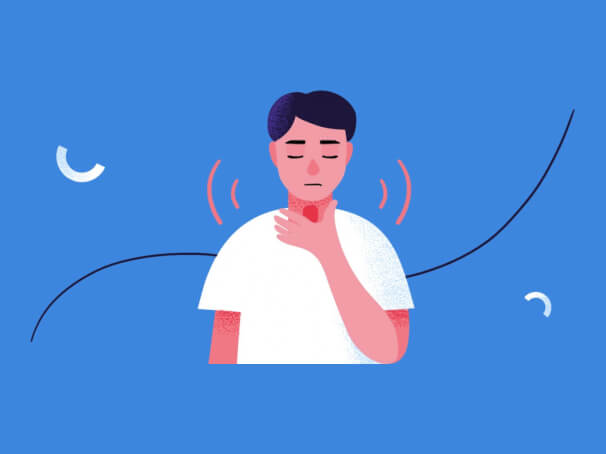
If you have anxiety, you likely experience a variety of difficult symptoms. Some common symptoms are feeling tense, nervousness, having racing thoughts, believing in worst case scenarios, and struggling with a rapid heartbeat.
Some people with anxiety also have symptoms that manifest physically, such as nausea and shakiness. Another physical symptom of anxiety (that is not often discussed) is gas problems. Although it may seem strange, many people do experience gas (burping and flatulence) connected to their anxiety.
Not only can anxiety cause gas problems and bloating - the gas problems themselves can lead to other symptoms that can actually increase anxiety. This can create a vicious cycle of anxiety and gassiness. While being gassy is generally nothing to worry about, recognizing the cause of the gas problems is important in terms of learning ways to intervene on the issue.
Anxiety and Gas
Different types of anxiety may contribute to different types of gas, or the extent that the gas affects you. While there may not be a concrete way to pinpoint the exact cause of the gas as it relates to one’s anxiety without medical tests, there are some common contributing factors.
- Air Swallowing During anxiety attacks, it is not uncommon to swallow excessive amounts of air. This often occurs unintentionally, as during a panic attack most people’s breathing patterns change significantly (i.e. - breathing more rapidly). Once the air is inside your body, it starts can cause pressure that needs to be released, which results in gas.
- Oxygen Release Similarly, those who have anxiety and panic attacks are more likely to experience hyperventilation. Hyperventilation is when there is too much oxygen in your blood. Eventually that oxygen needs to be dispelled, and gas may be the result. Essentially, hyperventilation is overbreathing: breathing very rapidly and deeply. Hyperventilation can lead to feeling light-headed, dizzy, experiencing chest pain, dry mouth, or even belching. Hyperventilation can leave someone feeling breathless.
- Digestion Issues The digestive tract is extremely sensitive to any change and/or stress. Anxiety can obviously lead to increased stress, which affects the gastrointestinal system. In terms of the entire gastrointestinal system and anxiety, symptoms are often felt in the stomach first. The stress (resulting from the anxiety) can prevent a person’s body from processing food efficiently, often passing it through the system too slowly. This can cause the bacteria in your body to build up and produce excess gas and bloating. This is why irritable bowel syndrome is also often connected to, or aggravated by, anxiety.
How Gas Can Cause Anxiety
While symptoms of anxiety (changes in breathing, stress on the gastrointestinal system) can cause gas, the opposite can be true as well, in that gas can cause anxiety - especially those already prone to it.
Significant amounts of gas can cause physical pain, and if the person experiencing the gas is unable to pass that gas (often due to being around other people) anxiety can be induced. This can be a vicious cycle, with anxiety causing gas and gas contributing to increased anxiety.
How to Reduce Anxiety-Related Gas
Once gas builds up in a person’s body, it needs to be released. This means finding a place where this can be done comfortably through belching or flatulating. Once the gas is out, the symptoms of that gas (and the anxiety experienced as a result of that gas) should decrease.
Individuals whose gas is caused by digestion issues may benefit from eating healthier meals with fewer gas causing ingredients. Dairy, for example, often contributes to gas. Talking to your doctor about food intolerances and anti-gas medications is also an option. Additionally, it could be helpful to rule out gastroesophageal reflux disease (GERD), or acid reflux, which can cause gas and other symptoms of anxiety.
If gas is primarily due to hyperventilation and air swallowing, learning to slow one’s breathing could be helpful. If you notice when the rate of breathing accelerates, try these techniques:
- Breathe in slowly, at a speed which lasts 5 seconds.
- Hold for a few seconds.
- Breathe out slowly, at a speed that lasts about 7 seconds.
Other ways people have reported managing their anxiety-related gas include:
- Eating and drinking slowly - Taking more time to chew and swallow food and drinks automatically helps with swallowing less air. Eating during times of less stress, and allowing adequate time to eat and enjoy a meal can all help with managing the pace of eating and drinking
- Quit smoking - If a person is a smoker and experiencing anxiety-related gas, it may benefit him or her to quit. When a person inhales smoke, he or she also inhales (and swallows) air.
- Skip the gum and hard candies - those who chew gum and/or eat hard candies throughout the day are far more prone to swallow more air than those who do not indulge in these things.
- Avoid carbonated beverages - carbonated drinks (i.e. - soda, beer, etc.) release carbon dioxide gas, which directly increases the chances of having gas and bloating.
- Check the dentures - if a person has dentures that are poorly fitting, he or she is likely swallowing extra air.
There are many possible factors contributing to anxiety-related gas. Address anything that could possibly be contributing to the gassiness. Also important is learning to manage the anxiety, as ultimately, this is the underlying cause and main contributing factor to many people’s gas and bloating.
SUMMARY:
Anxiety has a direct effect on the gut, and an indirect effect on breathing, muscles, digestion, and other causes of gas. There are also hyperventilation and air swallowing issues that can cause gas-like symptoms. Although there are some strategies for reducing these symptoms, controlling anxiety is the only effective long term strategy.











